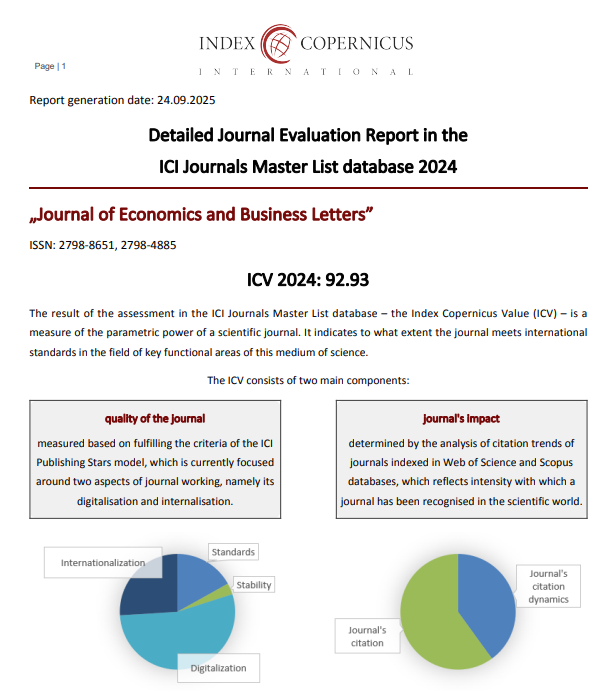Distribution economics analysis of government interventions in poverty reduction amid the COVID-19 pandemic in Klungkung Regency, Indonesia
DOI:
https://doi.org/10.55942/jebl.v4i2.304Keywords:
Poverty, Government Assistance, Distribution Economics, Social Sciences, COVID-19Abstract
Amid the pursuit of sustainable development goals in Indonesia, with a keen align- ment with the Sustainable Development Goals (SDGs), the pressing issue of poverty alleviation looms large. This study, set in Klungkung Regency, aims to comprehen- sively understand and address key facets of poverty alleviation during the COVID- 19 pandemic. The primary objective of this research is to investigate the impact of the COVID-19 pandemic on the depth of poverty in Klungkung Regency, Indone- sia. To achieve these objectives, our research involved the selection of 37 mainland Klungkung’s villages as our study area. We collected data from a diverse sample of 296 respondents, employing a combination of sampling methods, including acci- dental, snowball, and purposive sampling. Our findings reveal a significant increase in poverty levels among respondents attributable to the COVID-19 pandemic, with discernible variations across different sectors. Notably, agricultural laborers demon- strated greater resilience compared to their non-agricultural counterparts. Crucially, the government’s interventions emerged as pivotal, leading to an enhancement in purchasing capacity among beneficiaries. In terms of implications, this study un- derscores the critical importance of precisely targeted government interventions in poverty alleviation during crises. It highlights the need for policies that focus on both short-term relief and long-term economic stability.
References
Alam, T. M. (2020). Role of Islamic Finance during COVID-19: A Study on Practical Implication of Zakat as Short-term Emergency Support System. EJIF – European Journal of Islamic Finance, 16, 1–6. https://doi.org/10.13135/2421-2172/4581
Alper, A. E. (2018). The Relationship of Economic Growth with Consumption, Investment, Unemployment Rates, Saving Rates and Portfolio Investments in The Developing Countries. Gaziantep University Journal of Social Sciences, 17(3), 980–987. https://doi.org/10.21547/jss.342917
Asfarina, M., Ascarya, A., & Beik, I. S. (2019). Classical and Contemporary Fiqh Approaches to Re-Estimating the Zakat Potential in Indonesia. Journal of Islamic Monetary Economics and Finance, 5(2), 387–418. https://doi.org/10.21098/jimf.v5i2.1068
Banerjee, R., Mishra, V., & Asfaw, A. (2021). Energy poverty , health and education outcomes : Evidence from the developing world. Energy Economics, 101(January), 105447. https://doi.org/10.1016/j.eneco.2021.105447
Buheji, M., da Costa Cunha, K., Beka, G., Mavrić, B., Leandro do Carmo de Souza, Y., Souza da Costa Silva, S., Hanafi, M., & Chetia Yein, T. (2020). The Extent of COVID-19 Pandemic Socio-Economic Impact on Global Poverty. A Global Integrative Multidisciplinary Review. American Journal of Economics, 10(4), 213–224. https://doi.org/10.5923/j.economics.20201004.02
Carlsson-Szlezak, P., Reeves, M., & Swartz, P. (2020). What Coronavirus Could Mean for the Global Economy. Harvard Business Review, 3, 1–10. https://hbr.org/2020/03/what-coronavirus-could-mean-for-the-global-economy
Gerard, F., Imbert, C., & Orkin, K. (2020). Social Protection Response to the COVID19 Crisis: Options for Developing Countries. Oxford Review of Economic Policy, 36, S281–S296. https://doi.org/10.1093/oxrep/graa026
Haughton, J., & Khandker, S. (2009). Hand Book on Poverty + Inequality. World Bank.
Hidrobo, M., Hoddinott, J., Kumar, N., & Olivier, M. (2018). Social Protection, Food Security, and Asset Formation. World Development, 101, 88–103. https://doi.org/10.1016/j.worlddev.2017.08.014
Huang, I. Y.-F. (2020). Fighting COVID-19 through Government Initiatives and Collaborative Governance: The Taiwan Experience. Public Administration Review, 80(4), 665–670. https://doi.org/10.1111/puar.13239
Huang, L., Zhu, B., Wang, P., & Chevallier, J. (2021). Energy out-of-poverty and inclusive growth: Evidence from the China Health and Nutrition Survey. Structural Change and Economic Dynamics. https://doi.org/10.1016/j.strueco.2021.12.004
Hudaefi, F. A., & Beik, I. S. (2021). Digital Zakāh Campaign in time of COVID-19 Pandemic in Indonesia: A Netnographic Study. Journal of Islamic Marketing, 12(3), 498–517. https://doi.org/10.1108/JIMA-09-2020-0299
Ma, S., Kim, D. D., Cohen, J. T., & Scd, P. J. N. (2020). Measuring “Fearonomic Effects” in Valuing Therapies: An Application to COVID-19 in China. Value in Health, 23(11), 1405–1408. https://doi.org/10.1016/j.jval.2020.06.002
Marhaeni, A. A. I. N., Yasa, I. G. W. M., & Fahlevi, M. (2022). Gender and age in the language of social media: An easier way to build credibility. International Journal of Data and Network Science, 6(1), 209-216.
Marhaeni, A. A. I. N., Jermsittiparsert, K., Sudarmo, Indrawati, L. R., Prasetyo, A., Fuada, N., ... & Aljuaid, M. (2023). Adoption of the green economy through branchless rural credit banks during the COVID-19 Pandemic in Indonesia. Sustainability, 15(3), 2723.
Marhaeni, A. A. I. N, Sudibia, I. K., Andika, G., & Fahlevi, M. (2024). Impacts of Village Funding on Community Empowerment and Poverty in Klungkung, Bali. International Journal of Sustainable Development & Planning, 19(3).
Nurkse, R. (1953). Teori Lingkaran Setan Kemiskinan (Vicios Cycle of Poverty).
Olivia, S., Gibson, J., & Nasrudin, R. (2020). Indonesia in the Time of COVID-19. Bulletin of Indonesian Economic Studies, 56(2), 143–174. https://doi.org/10.1080/00074918.2020.1798581
Pritadrajati, D. S., Kusuma, A. C. M., & Saxena, S. C. (2021). Scarred for life : Lasting consequences of unemployment and informal self-employment An empirical evidence from Indonesia. Economic Analysis and Policy, 70(2), 206–219. https://doi.org/10.1016/j.eap.2021.02.009
Rizwan, M. S., Ahmad, G., & Ashraf, D. (2020). Systemic risk: The impact of COVID-19. Finance Research Letters, 36, 101682.
Todaro, M. ., & Smith, S. . (2003). Economic Decelopment in the Third World (Sixth Edit).
Wang, J., Wang, C., Li, S., & Luo, Z. (2021). China Economic Review Measurement of relative welfare poverty and its impact on happiness in China : Evidence from CGSS. China Economic Review, 69(August), 101687. https://doi.org/10.1016/j.chieco.2021.101687
Yuan, R., & Wang, J. (2021). Impacts of poverty alleviation on household GHG footprints in China. Energy Economics, 103(September),105602. https://doi.org/10.1016/j.eneco.2021.105602
Downloads
Published
How to Cite
Issue
Section
License
Copyright (c) 2024 Journal of Economics and Business Letters

This work is licensed under a Creative Commons Attribution 4.0 International License.
















